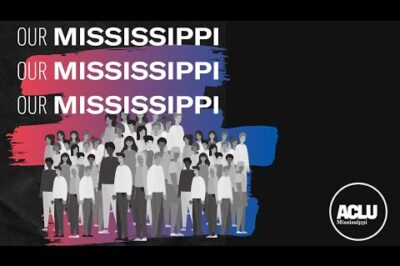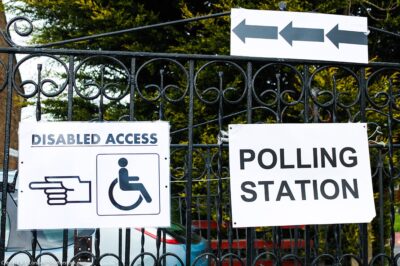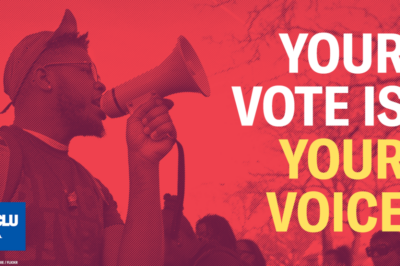Judges Have a Right to Vote in Primaries, ACLU Tells Virginia Ethics Committee
FOR IMMEDIATE RELEASE
RICHMOND, VA — In a letter sent today to members of the state judicial ethics committee, the American Civil Liberties Union of Virginia is urging them reconsider their recent ruling that state judges may not vote in primary elections.
Acting on behalf of three Virginia judges, the ACLU said in its letter that the Constitution protects the right of judges to vote, and that judges, like all citizens, ought not be discouraged from participating in the democratic process.
At issue is an opinion released by the nine-member ethics panel on November 15, concluding that Canon 5 of the Canons of Judicial Conduct for the State of Virginia bars judges from participating in primaries. The committee is appointed by the chief justice of the Virginia Supreme Court.
The rule, in part, says that judges “shall refrain from political activity inappropriate to the judicial office” and should not “attend political gatherings.” The Committee feared that judges who vote in a primaries might be viewed as partisan in their politics and therefore not capable of being impartial in their work.
One Committee member, Judge Sam Coleman III of the Virginia Court of Appeals, dissented, writing that the Canons were never intended to place such a restriction on judges and that voting in a primary is “a duty and obligation of responsible citizenship.”
“We certainly understand and respect the concerns of the Judicial Ethics Advisory Committee,” said ACLU of Virginia Executive Director Kent Willis, “but turning judges away from full, participatory citizenship will probably not yield better judges. Indeed, it could accomplish the opposite, encouraging judges to become out of touch with the society over which they hold considerable sway.”
“We are hopeful that the Committee will be willing to revisit this decision, and this time come to a different conclusion,” Willis said.
ACLU of Virginia Legal Director Rebecca Glenberg, Esq. and Victor M. Glasberg , Esq. submitted the letter on behalf of Richmond Circuit Court Judge James B. Wilkinson and two substitute judges for the Alexandria General District Court, Lisa B. Kemler and James C. Clark.
The ACLU’s letter follows. The Judicial Ethics Advisory Committee decision can be obtained from the ACLU or on the Internet at www.courts.state.va.us/jirc/opinion.html.
____________________________________________________________
December 15, 1999
VIA HAND DELIVERY
Judicial Ethics Advisory Committee
P.O. Box 367
Richmond, Virginia 23218-0367
Dear Members of the Judicial Ethics Advisory Committee:
We are writing on behalf of the Honorable James B. Wilkinson, Judge of the Richmond Circuit Court, the Honorable Lisa B. Kemler, substitute judge of the General District Court in Alexandria, and the Honorable James C. Clark, also of the General District Court in Alexandria, to request reconsideration of Judicial Ethics Advisory Committee Opinion 99-6, issued on November 15, 1999.
This request is made pursuant to Paragraph 51 of the January 5, 1999 Order of the Supreme Court of Virginia.
The Committee’s opinion holds that it is unethical for a judge to vote in a primary election. This interpretation of the Canons of Judicial Conduct violates judges’ constitutional right to vote. As Judge Coleman notes in his dissent, voting in a primary is “a duty and obligation of responsible citizenship and . . . neither Canon 5 nor 2 should be applied so expansively as to as to deprive a judge of that civic right or responsibility.”
The United States Supreme Court has long recognized that “[u]ndeniably the Constitution of the United States protects the right of all qualified citizens to vote, in state as well as in federal elections.” Reynolds v. Sims, 377 U.S. 533, 554 (1964). The Court explained the fundamental nature of this right:
“Undoubtedly, the right of suffrage is a fundamental matter in a free and democratic society. Especially since the right to exercise the franchise in a free and unimpaired manner is preservative of other basic civil and political rights, any alleged infringement of the right of citizens to vote must be carefully and meticulously scrutinized. Almost a century ago, . . . the Court referred to “the political franchise of voting” as “a fundamental political right, because preservative of all rights.” Reynolds, 377 U.S. at 561-62 (citation omitted).
The Constitution of Virginia also guarantees the right to vote. Article I, § 6 provides “that all men, having sufficient evidence of permanent common interest with, and attachment to, the community, have the right of suffrage . . . .” Under Article II, § 1, convicted felons and persons adjudicated mentally incompetent are the only exceptions to universal suffrage for adult resident citizens.
Because the right to vote is the bedrock of a democratic government, any exclusion of qualified voters from the franchise must be “necessary to promote a compelling state interest.” Kramer v. Union Free Sch. Dist. No. 15, 395 U.S. 621, 627 (1969). Accordingly, in a series of Equal Protection cases, the Supreme Court struck down regulations that denied various segments of the population the right to vote. See, e.g., Kramer (state may not limit right to vote in school district elections to residents who pay property taxes or have children in school); Dunn v. Blumstein, 405 U.S. 330 (1972) (state may not require residence in the state for one year as a prerequisite for voting); Harper v. Virginia Board of Elections, 383 U.S. 663 (1966) (state may not use poll tax to exclude poor from the franchise); Carrington v. Rash, 380 U.S. 89 (1965) (state may not deny suffrage to military personnel who move to the state during their term of service).
The right to vote encompasses primary elections as well as general elections. U.S. v. Classic, 313 U.S. 299 (1941). “When primaries become a part of the machinery for choosing officials, state and national, . . . the same tests to determine the character of discrimination or abridgment should be applied to the primary as are applied to the general election.” Smith v. Allwright, 321 U.S. 649 (1944). Cf. Morse v. Republican Party of Virginia, 517 U.S. 186 (1996) (party convention procedures subject to § 5 of the Voting Rights Act).
An ethical proscription against judges voting in primary elections is not necessary to promote a compelling state interest. The Committee takes the position that “‘reasonable’ people could easily perceive that a judge who votes in a party primary is unable to act with impartiality.” But the Committee offers no basis for such a perception. A primary voter, whether in a “firehouse primary” or one held by the State Board of Elections is not involved in political deal-making, discussion of the merits of the candidates or parties, or other “political” activity. Participation in a primary involves nothing more than the expression of a preference of one candidate (or, in the case of a firehouse primary, one delegate) over others of the same party.
Furthermore, in Virginia, voters do not register for particular parties, and firehouse primaries as well as Board of Elections primaries are open to all qualified voters. Thus, participation in a primary is not a declaration of affiliation with a particular party.
Finally, the fact that the Committee found no ethics opinions in other states barring judges from voting in primaries indicates the lack of a compelling state interest for such a restriction. Indeed, in many states, judges are elected officials who run on party tickets. Despite such thorough immersion in partisan politics, judges in these states are assumed to follow the ethical canons and administer justice impartially. In comparison, such a minimally political act as voting is unlikely to create any actual or perceived partiality.
Judges’ legal expertise and broad experience make them particularly intelligent voters whose participation in the electoral process is valuable to our democracy. Although judges must voluntarily accept limitations on their activities in order to preserve their impartiality, the right to vote is basic to every citizen and should not be abridged. Primary voting cannot be shown to impair judges’ impartiality or the public perception of the justice system. For these reasons, Judges Wilkinson, Kemler, and Clark request reconsideration of the Committee’s opinion finding primary voting to be unethical.
Thank you for your consideration of this matter.
Sincerely,
Rebecca K. Glenberg
Legal Director, ACLU
Victor M. Glasberg
Cooperating Attorney
cc: Judge James B. Wilkinson
Judge Lisa B. Kemler
Judge James C. Clark
Stay Informed
Every month, you'll receive regular roundups of the most important civil rights and civil liberties developments. Remember: a well-informed citizenry is the best defense against tyranny.




